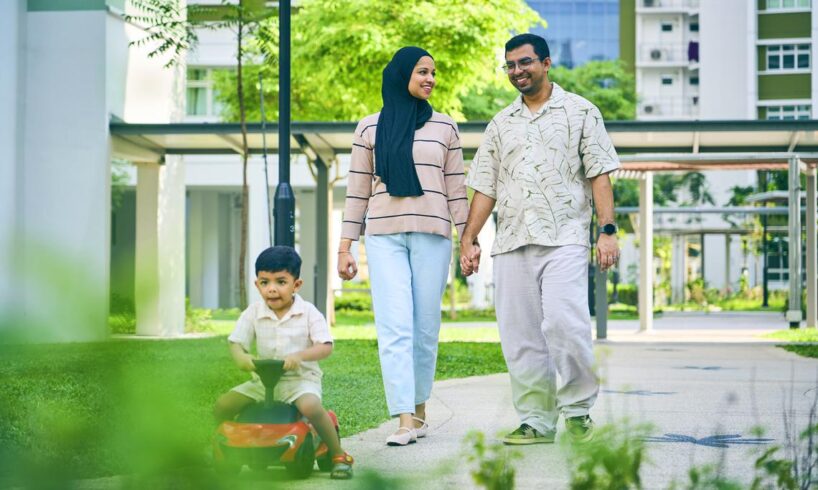
For many in their 30s, this season of life is defined by transition – raising young children, supporting ageing parents and carving out a fulfilling career.
In 2022, Mr Syed Sharif was in the thick of it. At the time, his wife and him were expecting their first child, and he was working shifts at a bank – while quietly going through a personal crossroads moment.
“I kept wondering – as a new father, am I doing enough? It wasn’t just about contributing financially. I wanted to be there emotionally, too,” he shares. “I knew I had to be there for my wife and son, get my resume done and look for a new job.”
The 34-year-old, who has a diploma in mechanical engineering from Singapore Polytechnic, had spent several years in roles that required shift work – a routine he knew was not sustainable for his family priorities in the long run. He also wanted to move into a more strategic role and saw upskilling as the first step.
Just before his wife gave birth, he
used his SkillsFuture Credit to fund a three-month course
in compliance – a field he had long been curious about. With the credit, Mr Sharif did not need to pay out of pocket for his course fees.
“I wanted to maximise the usage of my SkillsFuture Credit to open career pathways for me, like getting a higher-paying job with more responsibilities in an industry that I had always wanted to join,” he says.
Within a month of receiving his certificate, he managed to land a new role as a compliance officer at another bank.
It came with a significant pay raise, better long-term prospects, and structured working hours which would allow him to spend quality time with his family.
Mr Sharif (far right) finds balance through creativity too, such as co-hosting Vada Poche – a podcast conducted in a mix of English and Tamil – with his friends.
PHOTO: COURTESY OF SYED SHARIF
He is especially grateful for the support from his wife Shaheena, who left her job in insurance to focus fully on raising their son. She is now pregnant with their second child.
Government-paid paternity leave (GPPL) gave him two weeks of protected time to bond with his newborn and be present for his wife during those early, often overwhelming days as a first-time parent.
Now, with baby number two on the way, he is planning to use four weeks of GPPL and also tap on the
shared parental leave
– a scheme that currently offers six weeks of leave and will be extended to 10 weeks for parents of babies born from April 2026.
“Paternity leave was the most crucial part of giving my wife time to rest, while I cared for our son and bonded with him during those precious first days,” he says. “With our second child coming soon, we now know all about the government support that we can use.”
With his second child on the way, Mr Sharif feels more assured, knowing that he can tap additional support such as increased mandatory paternity leave and the new shared parental leave scheme.
PHOTO: SPH MEDIA
Meanwhile, although his company offers flexible working arrangements, Mr Sharif prefers the routine of being in the office. He gets to plan his day better and reserve the evenings for his family.
This structure also gives him time to invest in his passion project, Vada Poche, a podcast he launched in 2020 with three friends. The team spends four to 10 hours a week producing episodes that cover everything from social issues like gender equality, to spirited food debates, all delivered in Tanglish – a mix of English and Tamil.
One of Vada Poche’s co-founders is Mr Yuvaraj Uthaman, a marketing manager at an international business school, based in Singapore. Like Mr Sharif, the 32-year-old is navigating fatherhood, caregiving duties, career growth and passion-driven pursuits.
With an avid interest in personal training (PT) and working out since his polytechnic days, Mr Yuvaraj decided to earn an American Certification in Exercise in 2022 to take on freelance PT jobs.
Fellow Vada Poche co-host and new father Yuvaraj Uthaman is also finding his rhythm, as he balances familial duties, career growth and personal ambitions.
PHOTO: COURTESY OF YUVARAJ UTHAMAN
He used his SkillsFuture Credit to offset over 60 per cent of the fees for the three-month course, forking out only a couple of hundred dollars. Although he paused freelance work when his son was born, he hopes to return to it in the future.
“My challenge is juggling everything, from being a good caregiver to my wife and nine-month-old son to working in a fast-paced job, and finding time for our podcast,” he says. “The moment I found out we were expecting, I knew I had to earn this much and do this much by the due date.”
To help manage his concerns, Mr Yuvaraj tapped on the
migrant domestic worker levy concession
, which provides a monthly subsidy of $240 for Singaporean families with children under 16, allowing them to pay a concessionary rate of only $60 monthly.
This concession also applies if an eligible elderly person or someone with disabilities lives in the same home.
He gets to work from home on certain days, and his wife starts her job at a tuition centre only in the late afternoon. With an extra hand to assist with household chores, the couple gets to spend more time with their young son at home.
While the two long-time friends, who first got to know each other at their polytechnic gym, do not live with their parents, both are mindful of their responsibilities as sons – a familiar tension for many in the sandwiched generation.
Mr Sharif made the decision to purchase a flat in Ubi, close to his parents in MacPherson. His 61-year-old father is in the logistics industry and his 54-year-old mother gives pro-bono tuition in Tamil.
“They are both able-bodied but staying near them lets me run errands for them easily, like buying groceries or their favourite food,” he says. For families opting to buy a resale flat to live with or near their parents or child, there is the
HDB Proximity Housing Grant
, which offers up to $30,000.
Juggling work and fatherhood, Mr Sharif is thankful to live close enough to help out with his father (far right) and mother (centre), and stay connected as a family.
PHOTO: COURTESY OF SYED SHARIF
His parents also enjoy
savings for medical and dental care with their orange Chas cards
at neighbourhood clinics, which relieves some of the pressures associated with medical expenses in their senior years.
Besides his parents, Mr Sharif also lives just across the road from his in-laws, making it easy for the family to have regular meals with them. His in-laws, in turn, occasionally help with minding Mr Sharif’s son when he and his wife need to run errands.
Mr Yuvaraj’s mother, a 69-year-old retired teacher, lives with his sister but the siblings take turns to bring her for hospital check-ups for her rheumatism.
Two years ago, she also had a knee replacement surgery which was partially covered by her MediSave. She also benefited from the one-time MediSave bonus under the
Majulah Package
, which provides eligible seniors up to $2,000 in their CPF MediSave Account.
Although Mr Yuvaraj’s mother enjoys cooking, there are days when her rheumatism flares up so badly that she is not able to prepare meals. That is when CDC vouchers come in handy, as she can spend them on hawker food. Says Mr Yuvaraj: “These help to alleviate rising food costs and are so convenient to use.”
Mr Sharif agrees: “My parents look forward to initiatives like these because they like to know that they are being taken care of.
“I feel a sense of assurance that there’s a little extra help on the financial side. I’d like them to lead a comfortable life without having to over-worry about the basic cost of living.”
Discover how Forward Singapore schemes and programmes
can help support Singaporeans at every stage of life.
In partnership with gov.sg





